According to El Mundo, officers who entered the restaurant were immediately hit by an overpowering stench of decay. “Everything smelled of rotten seafood. It was almost unbearable,” one Madrid Municipal Police officer said. But the smell was just the beginning.
Inside, inspectors discovered a kitchen that looked more like an abandoned warehouse than a food service area. Surfaces were covered in grime, freezers overflowed with unmarked meat, and insects scuttled freely across the counters. Eight industrial freezers contained unlabeled products of unknown origin — no expiration dates, no supplier tags, and no documentation to prove traceability. It was impossible to know where the meat had come from, or even what species it was.
That uncertainty became even more disturbing when officers found several plucked pigeons, some freshly killed, stored in a back room. Witnesses claimed that staff had allegedly captured the birds directly from the streets and killed them — in some cases by kicking them to death — before preparing them for cooking. Investigators now believe some of the restaurant’s “roast duck” dishes may have been made using pigeon meat instead.
The findings immediately triggered outrage among both customers and animal rights groups. While serving pigeon is not illegal in itself if done through proper channels, sourcing wild urban birds — potentially carrying disease and contaminants — constitutes a severe public health risk and a clear violation of food safety law.
Beyond the meat scandal, police uncovered a series of additional safety breaches throughout the premises. Fire extinguishers were missing or installed incorrectly, failing to meet Spain’s basic height and accessibility requirements. Trash bins blocked emergency exits, creating serious hazards for both staff and diners. There were no working thermometers in the storage rooms — a fundamental legal requirement for monitoring refrigeration temperatures — and the walls were coated in layers of grease and mold.
Then came the most chilling discovery. Behind a shelving unit near the restrooms, officers found a hidden door that led to a concealed back room — a space not listed on the restaurant’s official floor plan. Inside that unregistered room, investigators encountered what one official later described as “a scene straight out of a nightmare.”
The small chamber was packed with deteriorating food: rusted freezers stuffed with more than 300 kilograms of spoiled meat and seafood, all giving off an unbearable odor. Strips of raw meat hung from a clothesline to dry, and several rat traps sat in the corners, some baited with old cuts of meat. The air was heavy with rot. A grease-coated fan whirred faintly overhead, circulating the smell through the ventilation system — likely the same odor residents had been complaining about for months.
Authorities shut the restaurant down on the spot. Health inspectors ordered the destruction of all food found on the premises and sealed the building pending further investigation. The restaurant owner, whose name has not yet been publicly released, faces multiple potential charges, including public health violations, animal cruelty, and offenses against consumer rights.
Police said the case illustrates the dangers of lax oversight in the restaurant industry. “It’s one thing to have minor hygiene infractions,” said one investigator. “This went far beyond that — this was deception and endangerment on a massive scale.”
Local residents were unsurprised but relieved to see the business finally closed. “We’ve been saying for years that something wasn’t right,” one neighbor told reporters. “The smell was disgusting, and sometimes we saw boxes of food left in the street for hours before being taken inside. None of us ate there.”
Despite the community’s suspicions, Jin Gu had managed to maintain a surprisingly positive image online. Before its closure, the restaurant held a 4.2-star rating on Google, with dozens of reviews praising its “authentic flavors” and “crispy duck.” Yet, scattered among those compliments were a few unsettling remarks that, in hindsight, sound far more ominous.
One reviewer, years earlier, had written: “The duck is very dry, full of bones, and has a strange taste — not very good.” At the time, it might have been dismissed as a picky customer’s opinion. Now, those words seem to hint at the grisly truth beneath the restaurant’s reputation.
City health authorities have since pledged to tighten inspection procedures for small restaurants operating in Madrid’s multicultural neighborhoods. “We don’t want this to fuel prejudice against immigrant-owned businesses,” one official said. “But food safety is universal. Everyone must meet the same standards.”
Animal welfare organizations have also called for stronger enforcement against illegal wildlife trade and the capture of urban pigeons. “These birds live in polluted environments and carry diseases. Using them as food is both cruel and dangerous,” a spokesperson for Madrid Animal Rescue said.
The case has left a lingering sense of unease among residents, especially those who had eaten at Jin Gu in the past. For many, the discovery that their “roast duck” might have been something entirely different was a nauseating betrayal of trust. “I feel sick just thinking about it,” one former patron told a local TV station. “We used to order from there every Sunday. I’ll never eat out again without checking the kitchen first.”
Authorities continue to analyze the seized food samples, hoping to determine exactly what was served to customers and how long the restaurant had been operating under such conditions. So far, preliminary tests have confirmed the presence of multiple animal species — including pigeon — in the restaurant’s meat stock.
As the investigation continues, the Jin Gu scandal stands as a grim reminder of what can happen when oversight fails and profit outweighs ethics. For the people of Madrid, it’s also a call to remain vigilant — to look beyond menus and ratings, and remember that not everything on the plate is always what it seems.

